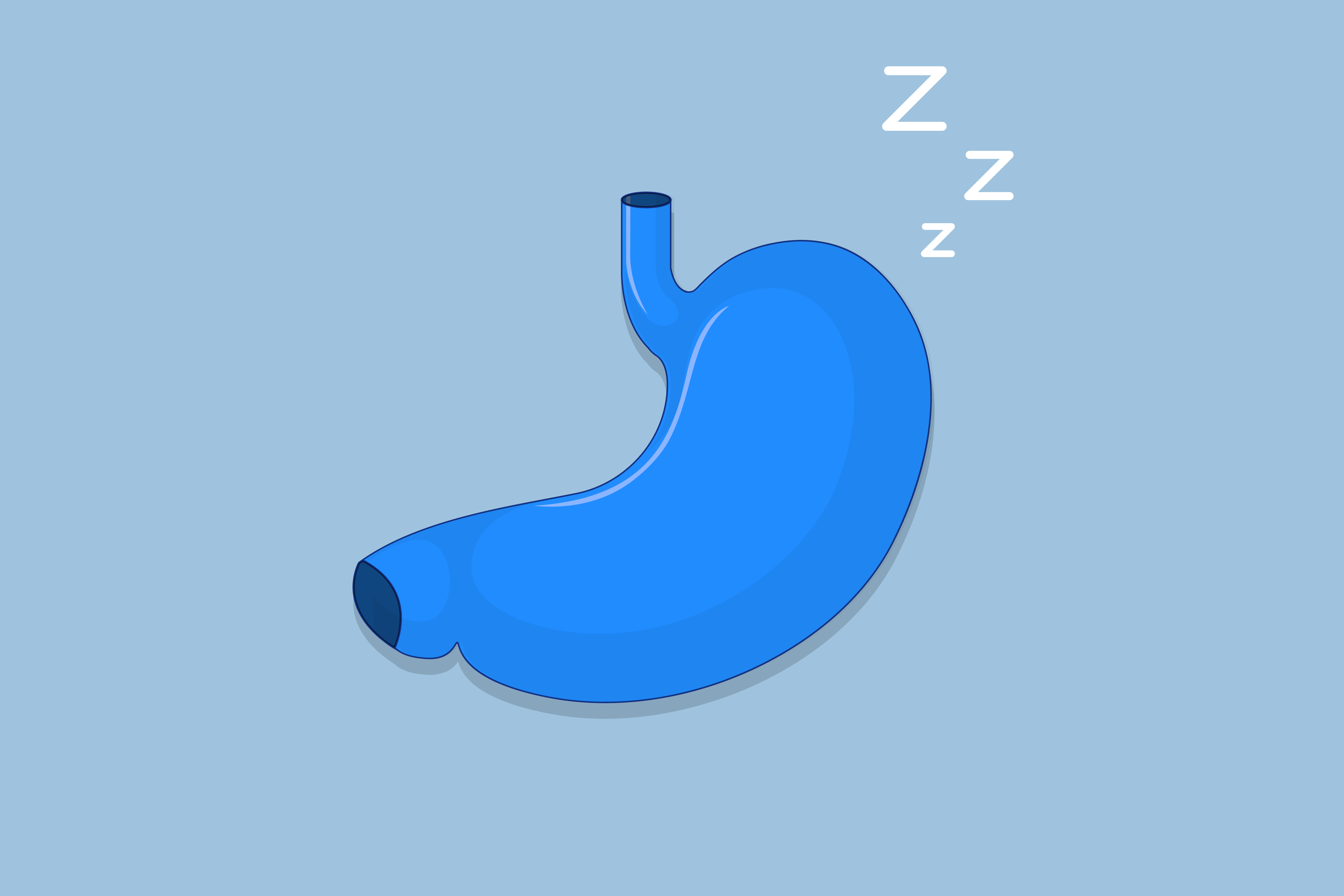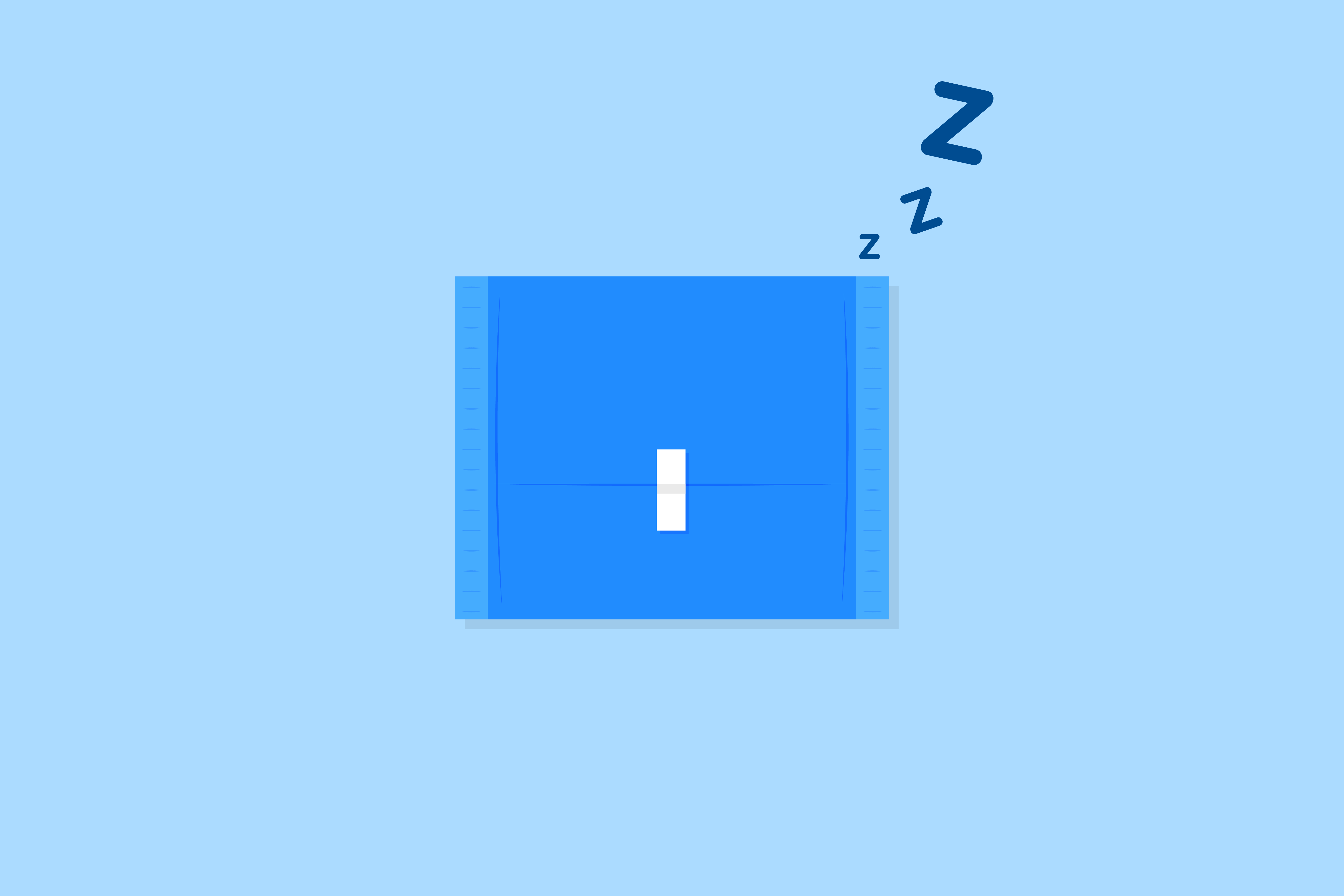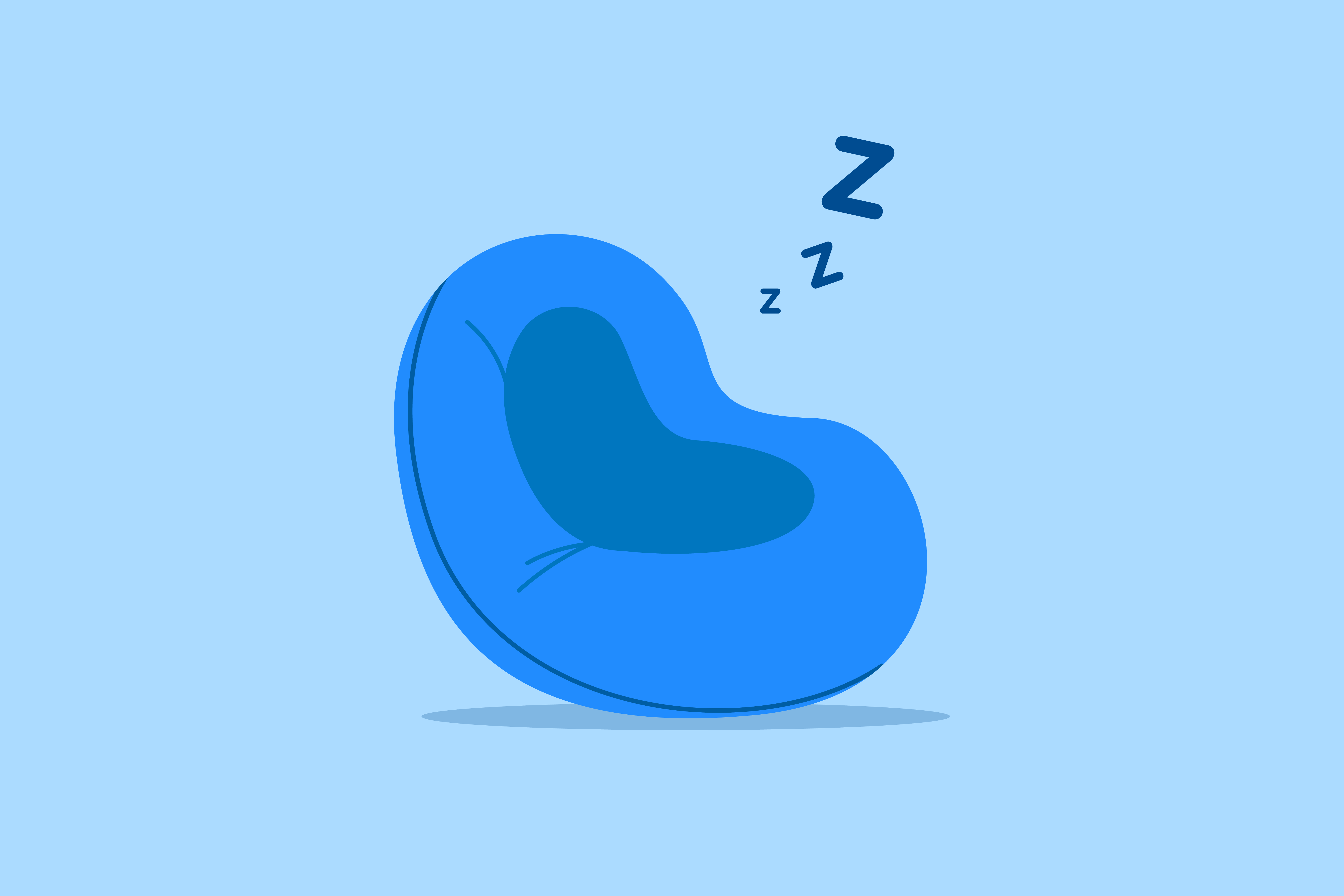Key Takeaways
- Understanding GERD: Gastroesophageal Reflux Disease (GERD) is a chronic condition characterized by the backward flow of stomach acid into the esophagus due to a malfunctioning lower esophageal sphincter (LES). Occasional acid reflux is normal, but frequent and severe nighttime symptoms are indicative of GERD.
- Impact on Sleep Quality: GERD significantly disrupts sleep quality. Nighttime symptoms, such as heartburn and acid regurgitation, are exacerbated when lying down, leading to frequent awakenings and sleep disruptions. Poor sleep quality can result in daytime fatigue, mood disturbances, and cognitive impairment.
- Long-Term Consequences: GERD not only affects sleep but also poses long-term health risks. Frequent acid reflux can lead to complications like esophageal ulcers and Barrett’s esophagus, a precursor to esophageal cancer. Nighttime reflux can increase the risk of sleep apnea, as stomach acid may enter the airway, causing irritation and airway relaxation during sleep.
Gastroesophageal Reflux Disease (GERD) is a chronic digestive disorder characterized by acid reflux and heartburn.
However, occasional symptoms of acid reflux are normal and can occur to anyone. But if the nighttime symptoms occur regularly and frequently, they can be serious.
The condition can significantly affect the quality of sleep and may cause many other health issues. Sleep and GERD symptoms have a bi-directional Verified Source ScienceDirect One of the largest hubs for research studies and has published over 12 million different trusted resources. View source effect on each other, says sleep expert Dr. Zhang, as one problem can lead to the other and form a vicious cycle.
However, by making small changes in your diet and lifestyle, you can better manage your sleep and symptoms.
Let’s have a deep look at how GERD and its potentially severe symptoms can affect your sleep.
Quick Guide: A 30-Second Summary
| Best Adjustable Bed for Acid Reflux | Amerisleep Adjustable Bed+ |
What Is GERD?
Gastroesophageal Reflux Disease Verified Source National Library of Medicine (NIH) World’s largest medical library, making biomedical data and information more accessible. View source is a persistent condition. In this condition, the lower sphincter — the valve that separates the stomach from the esophagus —- fails to function properly.It causes a malfunction in keeping the stomach acid in its place. As a result, stomach content, including the corrosive acids, follows back to the esophagus, causing discomfort and leading to long-term damage.
These frequent refluxes can cause esophageal erosion, strictures, and Barrett's esophagus. Verified Source National Library of Medicine (NIH) World’s largest medical library, making biomedical data and information more accessible. View source
Almost 20% of individuals Verified Source National Library of Medicine (NIH) World’s largest medical library, making biomedical data and information more accessible. View source experience acid refluxes associated with heartburn and acid regurgitation. It is normal to experience acid refluxes every once in a while. But for most people, these refluxes are frequently severe and can affect their quality of life.
How Does GERD Affect Sleep Quality
GERD is associated with poor sleep quality and can cause long-term health risks. Moreover, poor quality sleep can also exacerbate GERD symptoms, Verified Source National Library of Medicine (NIH) World’s largest medical library, making biomedical data and information more accessible. View source creating a vicious cycle of more and more severe symptoms.
Sleep Disruptions
GERD causes a malfunction in the lower esophageal sphincter, and the normal sleeping position gets the gravity against it — making it easier for stomach contents and acids to follow back. This results in heartburn and frequent awakenings, resulting in Verified Source National Library of Medicine (NIH) World’s largest medical library, making biomedical data and information more accessible. View source sleep disruption.
Daytime Consequences of GERD
Sleep disruptions at night can cause daytime fatigue and tiredness and affect your overall mood and productivity. Many people with GERD condition reported to have daytime sleepiness, abdominal discomfort, a chronic cough, and bloating.
The daytime symptoms of GERD, combined with a lack of restful sleep, can result in reduced alertness and impaired cognitive function. It can also result in mood swings, irritability, and even depression.
Long-Term Health Risks
Frequent acid refluxes can severely damage Verified Source National Library of Medicine (NIH) World’s largest medical library, making biomedical data and information more accessible. View source the epithelial lining of the stomach and can lead to conditions like esophageal ulcers or barret’s esophagus, which is a risk factor for esophageal cancer.
Nighttime reflux can also increase the risk of sleep apnea Verified Source National Library of Medicine (NIH) World’s largest medical library, making biomedical data and information more accessible. View source because the acid from the stomach may enter the throat and potentially the airway, causing irritation and inflammation. This can lead to the relaxation and collapse of the airway muscles during sleep, contributing to obstructive sleep apnea, where breathing repeatedly stops and starts throughout the night.
Insufficient sleep due to severe GERD symptoms at night can also weaken Verified Source National Library of Medicine (NIH) World’s largest medical library, making biomedical data and information more accessible. View source the immune system and make you more prone to infections and different health conditions.
Causes of GERD
There isn’t any single factor that causes GERD. It is often a result of a combination of risk factors that might become a cause of GERD.
- Weak Lower Esophageal Sphincter (LES): A potential risk factor of GERD is the weakening Verified Source National Library of Medicine (NIH) World’s largest medical library, making biomedical data and information more accessible. View source of the LES — the ring-like valve between the esophagus and stomach. Weakening of LES causes a malfunction in its ability to close and keep the stomach acids in place.
- Hiatal Hernia: A hiatial hernia Verified Source National Library of Medicine (NIH) World’s largest medical library, making biomedical data and information more accessible. View source is a condition that constitutes the bulging of the stomach through the diaphragm into the chest cavity. Hiatal hernia can impair LES function and become a potential risk factor for GERD.
- Obesity: Excess weight, particularly around the abdomen, increases pressure Verified Source National Library of Medicine (NIH) World’s largest medical library, making biomedical data and information more accessible. View source on the stomach and results in heartburn — a precursor of GERD.
- Medications: Certain medicines, such as NSAIDs Verified Source National Library of Medicine (NIH) World’s largest medical library, making biomedical data and information more accessible. View source are known to exacerbate the symptoms of GERD by causing acid reflux and heartburn.
- Dietary Choices: Spicy, oily, and acidic foods can exacerbate Verified Source National Library of Medicine (NIH) World’s largest medical library, making biomedical data and information more accessible. View source GERD symptoms. Overeating or eating such foods close to bedtime can also trigger acid reflux.
- Pregnancy: Pressure from the growing fetus and hormonal changes during pregnancy can be a potential risk factor for GERD. The condition is known to occur in approximately two-third Verified Source National Library of Medicine (NIH) World’s largest medical library, making biomedical data and information more accessible. View source of all pregnancies.
Common Symptoms of GERD at Night
Individuals with GERD symptoms commonly feel a burning sensation in the chest — nighttime heartburn — which is known to be a bit more intense because of the lying position, which makes it easier for the stomach acids to follow back into the esophagus. Some may even wonder if they’re experiencing heartburn or a heart attack. Verified Source Harvard Health Blog run by Harvard Medical School offering in-depth guides to better health and articles on medical breakthroughs. View source
Another common symptom is regurgitation, which is associated with the sensation of acid or food coming back up into the back of the throat or mouth.
When the stomach acid reaches back to the mouth, it can also cause coughing, choking, chest pain, sore throat, and hoarseness upon waking up from sleep. It can also cause shortness of breath and chest tightness.
Why Do GERD Symptoms Get Worse After Going to Sleep?
Many people have reported that GERD symptoms get worse after going to sleep. Your nighttime GERD symptoms can be because of any of the following reasons.
- Sleeping Position: The horizontal sleeping position eliminates gravity’s advantage of keeping the stomach acids in their place. This position for acid reflux makes the stomach acid flows back into the esophagus and exacerbates the symptoms of GERD.
- Reduced Saliva Production: The amount of saliva a person produces is greatly reduced during sleep. Contents in saliva help neutralize stomach acid and aid in digestion. This reduced production of saliva can result in intense symptoms of GERD.
- Relaxation of Lower Esophageal Sphincter (LES): The pressure of the LES reduces Verified Source National Library of Medicine (NIH) World’s largest medical library, making biomedical data and information more accessible. View source during sleep, which makes it more likely for the stomach acid to flow back into the esophagus.
All these factors cause sleep disturbances, which further intensify the acid reflux symptoms. People with frequent awakening from sleep are reported Verified Source National Library of Medicine (NIH) World’s largest medical library, making biomedical data and information more accessible. View source to have longer acid reflux episodes and a high index of GERD symptoms.
How to Get Better Sleep with GERD
It is challenging to get better sleep when you have GERD. Plus, the inability to have proper sleep can also exacerbate your symptoms — hence making it more challenging to get proper sleep.
However, a few changes in your sleeping position, diet, and lifestyle can help minimize your symptoms — facilitating better quality sleep.
Adjust Sleeping Position
Instead of lying on your back, sleep on your left side. This position is the most comfortable and helps minimize GERD symptoms. The stomach acid stays in its place due to gravity, the stomach’s shape, and the angle between the esophagus and the stomach. Just make sure you choose a soft mattress that suits side sleeping.
Plus, try to keep your head elevated by 6 to 8 inches to reduce acid reflux. An adjustable bed is one of the best way to do so, though you can also use a wedge pillow.
Modify Your Diet
Consumption of Verified Source National Library of Medicine (NIH) World’s largest medical library, making biomedical data and information more accessible. View source a high-fat diet, carbonated beverages, citrus products, and spicy, salty, and fried foods are potential risk factors for GERD. Keep a good proportion of green cruciferous vegetables in your diet.Maintain Healthy Weight
Flabbing around your waist can put pressure on the stomach and exacerbate your GERD condition, much the way that weight affects sleep apnea with pressure on the airway. Losing weight can alleviate some pressure and ease your condition.
Reconsider Your Medications
Certain medications like over-the-counter antacids or prescription medications like proton pump inhibitors can help control GERD symptoms. Dr. Zhang pointed out that a study Verified Source National Library of Medicine (NIH) World’s largest medical library, making biomedical data and information more accessible. View source showed that proton pump inhibitors, which is commonly prescribed for acid reflux, improves both nighttime GERD symptoms and subjective sleep parameters.
Talk to your healthcare provider to see if a prescription is right for your needs.
Frequently Asked Questions
Can GERD cause sleep problems?
Yes, if you have GERD, you can also have sleep problems. The episodes of acid reflux exacerbate due to lying position and can cause discomfort or pain that can lead to frequent awakenings throughout the night. It results in a disrupted sleep cycle and sleep problems.
A recent study, Verified Source National Library of Medicine (NIH) World’s largest medical library, making biomedical data and information more accessible. View source pointed out by Dr. Zhang, showed that interventions to manage GERD symptoms has resulted in improved subjective sleep parameters and enhanced sleep quality.
Can GERD heal on its own?
Occasional events of acid refluxes are common and are temporary. They can resolve on their own. However, chronic GERD is a persistent condition and typically requires treatments and lifestyle changes. To heal GERD, you will need to make dietary adjustments, medications, and better sleeping habits.
Does GERD cause anxiety?
Yes, GERD may influence how much anxiety you feel, along with depression, as a 2018 study noted. The condition comes with several challenges and chronic discomfort that can cause irritability and increase anxiety levels. The adverse effects of GERD on sleep quality also trigger anxiety.
How bad can GERD make you feel?
GERD, or acid reflux disease, can significantly affect one’s quality of life. Its symptoms, like heartburn, chest pain, regurgitation, and difficulty in swallowing, can be distressing and can be misinterpreted as a heart attack. GERD-related chest pain and acid reflux episodes can last for hours.
What to do when GERD attacks at night?
First, elevate the upper part of your body using pillows or a bed wedge to prevent stomach acid from flowing into the esophagus. Sleeping on your left side can also minimize acid reflux, as it keeps the lower esophageal sphincter (LES) above the level of stomach contents.
Avoid late-night meals and aim to finish eating at least two to three hours before bedtime, allowing your stomach time to digest food properly. Pay attention to your diet by avoiding trigger foods and beverages such as caffeine, alcohol, spicy or acidic items, and chocolate, especially in the evening. Staying hydrated is essential, but limit your fluid intake close to bedtime to prevent overloading your stomach.
Conclusion
GERD, simply called acid reflux when sleeping, can bring chronic discomfort and inconvenience in one’s life. Its symptoms make it difficult to stay or fall asleep, which worsens the symptoms even more, hence, more discomfort.
There is a range of symptoms associated with this condition, and it requires a multifaceted treatment approach, from lifestyle changes to potentially using accessories like a wedge pillow for acid reflux.
By modifying your diet, sleeping position, and lifestyle, you can better manage your GERD condition. However, if your symptoms are getting unmanageable, it is best to consult with a healthcare provider for better treatment.
About the author
Mitchell Tollsen is a graduate student and a freelance writer who’s contributed to the Early Bird blog for three years. Mitchell’s always been fascinated by the science of sleep and the restorative processes our bodies undergo when at rest. The self-titled “Sleep Expert” is always looking for ways to improve his shut-eye, and throughout the years has implemented numerous lifestyle changes and tried dozens of sleep-promoting gadgets to determine the best ways to truly get better rest.
View all posts





